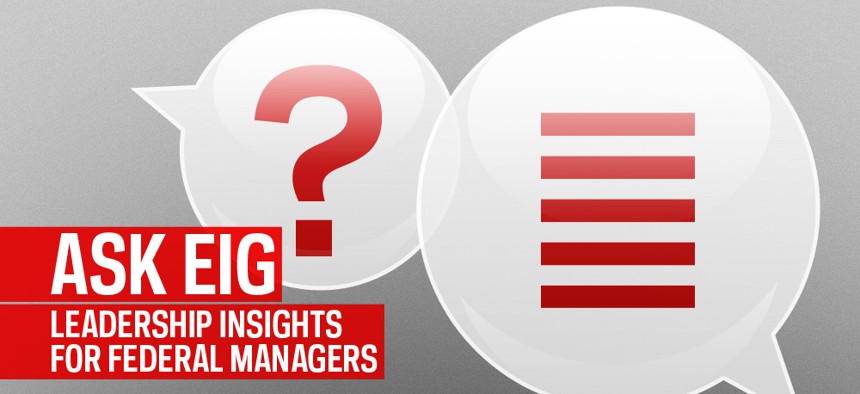
With the pitched battle in Congress that led to the recent government shutdown and the growing debt-ceiling debate, can leadership lessons be drawn from this conflict to help leaders of organizations deal with similar internal battles?
--Jackson Nickerson
This column typically is reserved for responses to leadership questions from government executives. The government shut down is so rare and striking that I took liberty to pose my own question, the response to which I hope will be of value to government executives who face such pitched battles in their own organizations.
From time to time throughout history, across civilizations, and within organizations, communities occasionally experience epochs of righteousness. Righteousness is a word invented by William Tyndale, who first translated Greek and Hebrew bibles into English around 1526. This earliest meaning of righteousness is associated with an attribute of God and describes upright, moral, and guiltless actions. Ironically, his translation, which eventually formed the basis of the King James Bible, was viewed as heresy by righteous clerics who executed him and then burned his corpse at the stake.
Today, we live in an age of righteousness in which we find polarized communities in the United States as well as around the globe. Each pole believes that their own righteousness is moral and just and believing that the other side is immoral, the devil, or worse. Whether it is health care, the gun debate, abortion, the debt, size of government, social transfers, or other wedge issues, both sides have a righteousness that resists easy resolution. What can leaders who experience such polarizing righteousness in their organization do to resolve the conflict and move forward?
Leaders can travel along four paths to resolve the conflict of righteousness. Each path has different implications for organizational leaders.
1. War: When two righteous sides confront each other the most common pathway to resolution is war. Ultimately, one side must vanquish the other, which can sow the seeds of later insurrections. The American Civil War offers one example and modern day terrorism offers another. Current behaviors in Congress too might be described in this way.
In an organizational context, the conflict between executives and their fiefdoms ends only when one side wins and the other is defeated in battle. The leaders of the defeated side are retired or fired. Leaders who choose such a path end up winning by using strategy and tactics to destroy their enemy. Doing so, however, can be extraordinarily costly because of the great enduring harm that is inflicted on everyone in the organization.
2. Concessions: An alternative path is to negotiate and find a middle ground by each side making concessions. In practice, concessions can be effective but rarely are when righteousness is involved. Righteousness implies that people believe they are taking a moral and ethical stance, which means they are unable to understand and feel empathy for the opposing side. Indeed, in such situations debates reduce to name calling, which only hardens righteousness and makes negotiation impossible. All one needs to do is read commentaries below any online New York Times article on a wedge issue to see the dynamic play out. Also, one round of concessions encourages the righteous to demand more and then take more extreme positions in successive issues, which can stimulate greater righteousness from the opposing side. The net result is that making concessions among the righteous typically leads to war.
The challenge for organizational leaders is to find ways to restructure incentives so that it becomes in the best interests of both sides to negotiate in a way that saves face. Incentives are not only economic, but also can be social, emotional, and career concerns designed to build trust and reputation instead of destroying them. Also, the leader must rebuild respect and understanding by keeping righteous actors from demonizing each other, which is no easy challenge. Leadership success by making concessions is rare when dealing with righteousness opponents.
3. Governance: In many situations, communities can resolve conflict from righteousness if a large and powerful enough interests use mechanisms of governance as a pathway to remove and replace righteous leaders. In essence, an often-silent middle must rise up and use the institutions available to them to bring in new leadership. Governance mechanisms sometimes can be manipulated, like a gerrymandered electorate found in many Congressional districts, thereby inhibiting the use of the institutions of governance to constructively resolve conflict, which leads back to the first pathway—war.
Overarching leadership, hierarchical authority, oversight boards, ethics and audit panels, investigations, etc., all can question the legitimacy of leaders who display righteousness in organizational settings. Such leaders can be fired. Of course, fired leaders can fight back in various ways and in some instances challenge the legitimacy of the various governance decisions. Protests, litigation, and reputational assaults all impose costs on organizations and surviving leaders. Such assaults can even weaken or permanently effect the organization or institution. In sum, organizational leaders can appeal to institutional supports but in so doing must assess the extent to which those who are removed from power can damage these supports.
So far, the three paths don’t offer much hope. Conflict among the righteousness ultimately is resolved by creating winners and losers. But costs on people, organizations, and institutions are excessive and potentially destabilizing. In other words, most lose. Is there any way in which the righteousness can be brought together to collaborate and find, on balance, a positive outcome for all? Is there hope for a better way?
4. Formulation: I believe that there is a fourth path if warring factions adopt an appropriate mindset and process for inquiry. Battles between the righteous take place in large part because combatants focus on solutions. Their righteous zeal has convinced them that they have the right solution for which they are willing to fight. It is this dynamic and focus on solutions that creates wedge issues and destroys hope. For example, those involved in the gun debate focus on either eliminating regulation of weapons or restricting assault weapons and magazine size, competing solutions that largely ignore formulating the challenge in a comprehensive way.
Organizational leaders have the ability to convene meetings among combatants and use specific expert processes to formulate first symptoms and then causes without ever speaking of solutions. Engaging combatants in formulation is a source of hope. Doing so in a way to achieve consensus necessarily requires opponents to engage in conversation, share information and knowledge, to listen and understand each other to comprehensively formulate challenges. Such comprehensive formulation gives rise to the development of creative solutions that will never be found or adopted in a war filled with righteousness. While such processes may be difficult in a national political context, they are feasible in an organizational one.
Perhaps the organizational leadership lesson from an age of righteousness is that either the war better be worth fighting, as the paths of concessions and governance are unlikely to resolve the conflict, or that specific expert processes better be used to comprehensively formulate the challenge before trying to solve it. Either way, it might be wise for organizations and even society to reserve righteousness for an attribute of the gods because in humans, all too often it leads to the costs and tragedies of war.
Duce a mente (may you lead by thinking).
Jackson Nickerson
NEXT STORY: What to Do When the S**t Hits the Fan







